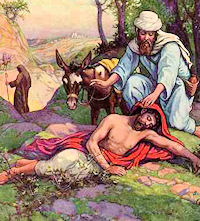“Which is the first of all the commandments?” Jesus replied, “The first is this… . The second is this.” (Mark 12:28-31)
Love God and love your neighbor. The wisdom of these words may not strike us with the freshness that they would have conveyed to Jesus’ audience. The idea that the first and greatest command is to love God with all our hearts and souls wasn’t a new thought. It’s recorded in a much older reading in the Hebrew Scriptures (Deuteronomy 6:5). But the idea that loving one another is just as important was much more groundbreaking.
Jesus considered these two commands bound so closely together that he taught that if someone is offering a gift at the altar—loving God— and remembers that his brother has something against him, he must leave his gift and go love his brother first (Matthew 5:23-24). And John could write: “Whoever does not love a brother and sister, whom he has seen, cannot love God, whom he has not seen” (1 John 4:20).
There’s something about loving God with our whole hearts that naturally flows into loving other people. Perhaps it is because God has created us in his own image. There’s a picture of him, a treasure from him, in each of us. So when we see each other, we are seeing a reflection of the Lord. Or maybe it’s because God loves each of us with such fierce devotion that for us not to share that love with each other would be an offense to him. Or maybe it’s both!
In the end, it doesn’t matter which approach is best. What matters is that you do something about it! God has called us to love each other just as fully as we love him. That’s not always an easy task, and some people seem determined to make it even harder for us. But our Father is ready to help. He is waiting for us to take the first step. Then he will respond with divine grace to soften our hearts.
“Lord, show me the treasures you have placed in all the people around me—especially those I find hardest to love!”
Deuteronomy 6:2-6; Psalm 18:1-4, 47, 51; Hebrews 7:23-28
1. In the First Reading, the Great Commandment to “love the Lord, your God, with all your heart, and with all your soul, and with all your strength” is first spoken to the people by Moses. He then tells them to “Take to heart these words which I enjoin on you today” (Deuteronomy 6:6). How well do you “take to heart” these words? 2. The Responsorial Psalm continues the theme of the First Reading, “I love you, O Lord, my strength.” The psalmist goes on to proclaim some of the reasons for his great love for the Lord. What are some of them? How would you proclaim your reasons for loving the Lord? 3. How would you describe the difference between Jesus’ priesthood and the Levitical priesthood, as presented in the Second Reading? Why is Jesus’ priesthood so much more powerful than theirs, especially in its impact on our lives through the sacrifice of the Mass? 4. In the Gospel, Jesus repeats the words of Moses from the First Reading and adds the commandment to “love your neighbor as yourself.” He then says, “There is no other commandment greater than these.” Why is this so? What are the obstacles you encounter during the day that keeps you from obeying these commandments more faithfully in your everyday life? What steps can you take to remove some of these obstacles? 5. The meditation describes two reasons why we are called to love others: 1) “loving God with our whole hearts” so that it “naturally flows into loving other people” and 2) “because God loves each of us with such fierce devotion that for us not to share that love with each other would be an offense to him.” Which of these reasons resonates most with you? Why? Are there some steps you need to take to love God more wholeheartedly or to open yourself more to a greater experience of his love for you? 6. Take some time now to pray and ask for the grace to see the Lord’s presence in others, no matter what kind of relationship you have with them right now. Use the prayer at the end of the meditation as the starting point.Questions for Reflection or Group Discussion
